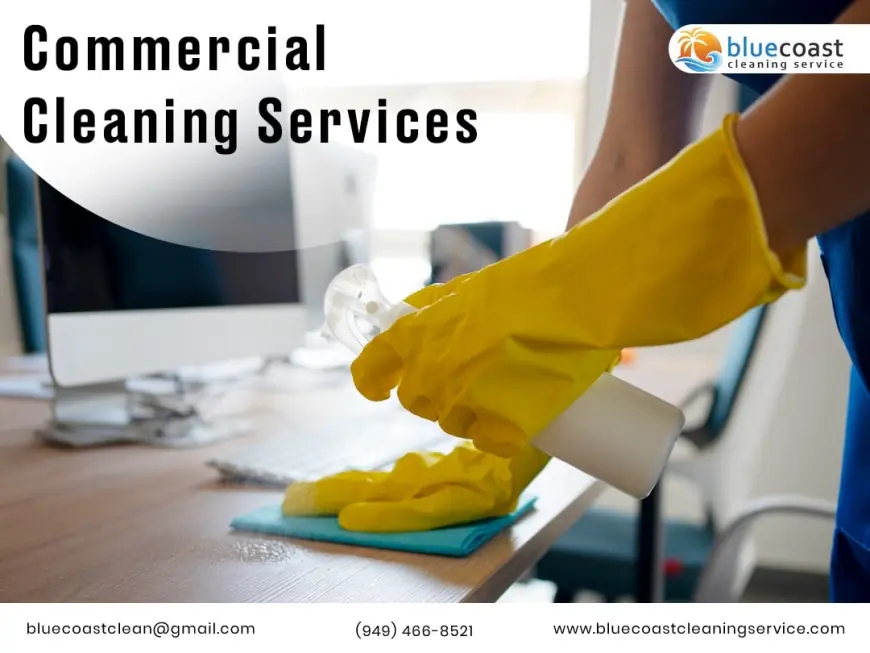How Is Commercial Cleaning Different in Healthcare vs. Corporate Settings?
When it comes to Cleaning Services Commercial, not all environments are the same. Cleaning a hospital or healthcare facility involves more than just tidying up.

When it comes to Cleaning Services Commercial, not all environments are the same. Cleaning a hospital or healthcare facility involves more than just tidying up. It requires extra care, specialized techniques, and strict rules to keep patients safe. On the other hand, cleaning in a corporate office has its own focus, creating a clean, pleasant space for workers and visitors. Both need attention to detail, but their goals and methods differ a lot.
Let’s explore how commercial cleaning changes when it moves from a healthcare setting to a corporate one.
1. The Purpose Behind Cleaning
In healthcare, cleaning is about stopping the spread of germs and infections. Hospitals and clinics have many sick people, so surfaces can carry dangerous bacteria or viruses. Cleaning here must remove these risks to protect everyone’s health.
In contrast, corporate offices focus on a neat, welcoming space that looks professional. While hygiene is important, the goal is also about comfort and appearance. For example, clean desks, shiny floors, and fresh air help employees stay productive and visitors feel good.
2. Cleaning Products and Equipment
Healthcare cleaning uses special disinfectants approved for killing harmful germs. These products often need to meet high safety standards to avoid causing problems for sensitive patients. Cleaners may use hospital-grade solutions and disposable wipes to avoid cross-contamination.
In corporate buildings, cleaners typically use general-purpose cleaners. These products clean dust, dirt, and grime but may not always disinfect deeply. Equipment like vacuum cleaners, mops, and cloths are reused carefully, but the rules are less strict than in healthcare.
3. Frequency and Timing of Cleaning
Hospitals require cleaning many times a day, especially in areas like operating rooms or patient rooms. Some zones might be cleaned immediately after use. This constant cleaning helps control infections.
Offices usually have cleaning schedules that happen once or twice daily, often after work hours. The focus is on empty spaces when fewer people are present to avoid disturbance. Regular but less frequent cleaning keeps the space tidy and fresh.
4. Training and Knowledge of Cleaners
Cleaners working in healthcare need special training. They must understand infection control, use protective gear correctly, and follow strict protocols. Their job is critical in preventing illness.
Corporate cleaners also need skills, but the training focuses more on efficiency, safety with equipment, and good customer service. They learn how to handle office supplies and clean without interrupting work.
5. Attention to High-Touch Areas
Both healthcare and corporate settings pay close attention to high-touch surfaces like door handles, light switches, and phones. In hospitals, these areas are cleaned and disinfected frequently to reduce risk.
In offices, high-touch cleaning is also important, especially with shared equipment like printers or break room appliances. However, the intensity and frequency are usually less than in healthcare.
6. Handling Waste and Hazardous Materials
Healthcare facilities generate biohazard waste such as used bandages, needles, and other materials that can be dangerous. These require special disposal methods to keep everyone safe.
Corporate offices mainly deal with regular trash and recycling. Hazardous waste is rarely a concern, so disposal is simpler and follows standard rules.
7. Use of Technology in Cleaning
In recent years, healthcare cleaning has included advanced tools like UV light machines to kill bacteria and viruses in patient rooms. These tools add an extra layer of protection.
Offices may use technology for efficiency, like automatic floor scrubbers or air purifiers, but the focus is more on appearance and comfort rather than strict germ control.
8. Regulations and Standards
Hospitals and healthcare centers must follow strict laws and guidelines about cleaning and hygiene. These rules come from health organizations and government agencies. Failure to comply can risk patient health and legal issues.
Corporate cleaning follows safety rules too, but these are less demanding. Standards are set by building management or cleaning companies and focus more on safety and quality of service.
In Closing:
Commercial cleaning changes a lot depending on where it happens. The needs of healthcare and corporate spaces require very different approaches, products, and knowledge. By knowing these differences, businesses can choose the right cleaning service to fit their environment and keep everyone safe and comfortable.
If you want reliable Cleaning Services In Orange County, Ca, selecting a company familiar with these unique needs is smart. This ensures that every space receives the care it deserves, creating a healthier and more welcoming place for everyone.
What's Your Reaction?
 Like
0
Like
0
 Dislike
0
Dislike
0
 Love
0
Love
0
 Funny
0
Funny
0
 Angry
0
Angry
0
 Sad
0
Sad
0
 Wow
0
Wow
0

















































